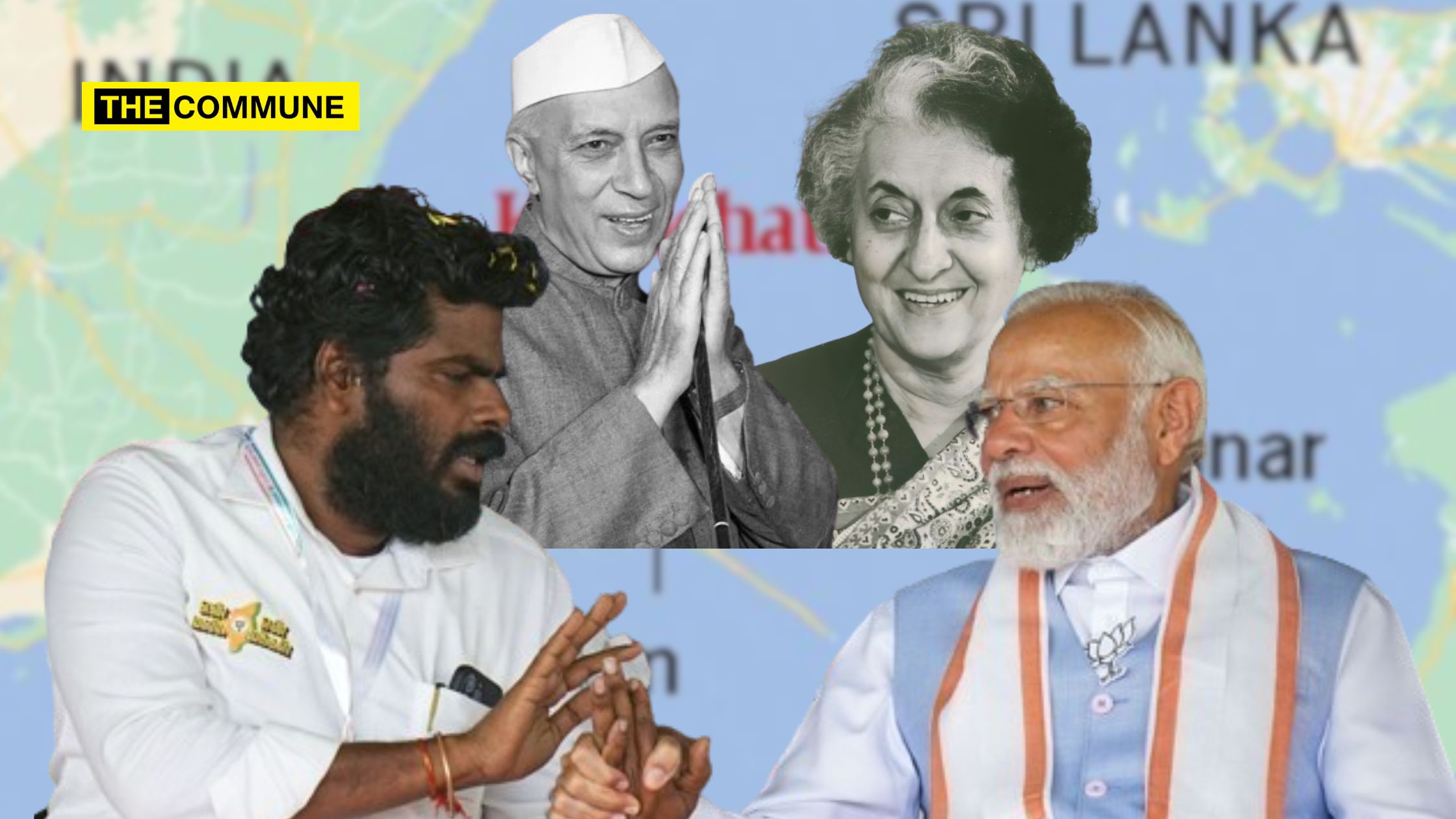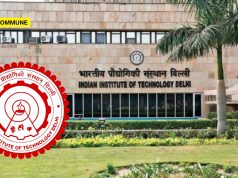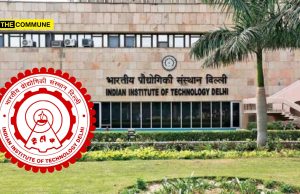
The decision made by Indira Gandhi’s government in 1974 to hand over Katchatheevu to Sri Lanka has emerged as a central issue in the 2024 Lok Sabha campaign in Tamil Nadu. Sri Lanka’s persistent efforts, historical evidence, and legal intricacies underscore India’s relinquishment of the island, sparking discussions on sovereignty and geopolitical dynamics. Recent revelations from a Right to Information (RTI) response obtained by Tamilnadu BJP president K Annamalai shed’s light on how Indira’s Congress government conceded to Sri Lanka’s claims.
This information is been underscored by official documents and parliamentary records. These documents reveal how an indecisive India lost control of the island in the Palk Strait to a smaller, yet determined, country.
Documents acquired by Tamilnadu BJP chief Annamalai through an RTI application highlight Sri Lanka’s persistent pursuit of the 1.9 square km island, located approximately 20km from the Indian shore, despite India contesting its claims for decades before ultimately acquiescing. Sri Lanka, then known as Ceylon, began asserting its claim to Katchatheevu immediately after gaining independence, asserting that the Indian Navy (then Royal Indian Navy) could not conduct exercises on the island without its permission. This stance was evident as early as October 1955 when the Ceylon Air Force held exercises on the island.
The steadfastness of Sri Lanka’s position is reflected in a memorandum from India’s first Prime Minister, Jawaharlal Nehru, dated 10 May 1961, dismissing the issue as inconsequential. Nehru’s memorandum, part of a note prepared by then Commonwealth Secretary Y D Gundevia, was shared by the Ministry of External Affairs (MEA) as background information with the Informal Consultative Committee of Parliament in 1968.
Nehru minute stated, “I would’ve no hesitation in giving up claims to the island… I attach no importance at all to this little island and I would have no hesitation in giving up our claims to it. I do not like this pending indefinitely and being raised again in Parliament”.
The background information provides insight into India’s wavering stance leading up to 1974, when it ultimately renounced its claim entirely. The ministry stated, “The legal aspects of the question are highly complex. The question has been considered in some detail in this ministry. No clear conclusions can be drawn as to the strength of either India’s or Ceylon’s claim to sovereignty”.
In 1960, despite the contrary opinion of the then Attorney General M C Setalvad, it was believed that India had a stronger claim over an island formed by a volcanic eruption. Setalvad acknowledged the complexity of the matter but ultimately leaned towards the conclusion that India held sovereignty over the island. This conclusion was based on the historical granting of zamindari rights by the East India Company to the Raja of Ramnad (Ramnathpuram) over the islet and its surrounding resources.
These rights, which were held continuously and without interruption from 1875 to 1948, were transferred to the State of Madras after the abolition of zamindari rights. During this period, the Raja exercised these rights independently, without any obligation to pay tributes or taxes to Colombo.
Documents also reveal that the Ministry of External Affairs’ Joint Secretary, K Krishna Rao, while not entirely certain, believed that India had a strong legal position that could be utilized to secure fishing rights. This is particularly significant given the ongoing issue of Indian fishermen being detained by the Sri Lankan Navy near the island.
In 1960, Rao remarked that while Colombo’s assertions appeared more substantial, India still possessed a strong legal argument that could be vigorously presented. He clarified that he wasn’t implying India lacked any legal basis. Even Gundevia, who deemed the uninhabited island with just a church on it as insignificantly important, opposed the idea of risking its relinquishment, as conveyed by the Ministry of External Affairs to the consultative committee in 1968. During the same year, the opposition criticized the Indira Gandhi government for seemingly hesitating to challenge Sri Lanka’s intensified assertion over the island.
During a parliamentary discussion, there was a demand for, and subsequently, a discussion took place regarding mounting suspicions surrounding a clandestine deal supposedly negotiated between Indira Gandhi and her Ceylonese counterpart, Dudley Senanayake, during Senanayake’s visit in 1968. This deal was rumored to involve the handover of the island. Opposition members criticized the government for not addressing the warning signs such as statements made by the Ceylonese Prime Minister in their Parliament and indications on maps showing Katchatheevu as Ceylonese territory, interpreting these as gradual steps towards the acquisition of the island.
The Indian government refuted claims of having signed away the island but acknowledged its disputed status. It stressed the importance of balancing India’s claim with the necessity of maintaining strong bilateral relations. The response by Surendra Pal Singh, Deputy Minister in the Ministry of External Affairs, that the island was uninhabited appeared reminiscent of Nehru’s remark about Aksai Chin, which incited anger among socialist veterans like Madhu Limaye and Rabi Ray.
The opposition forcefully raised the issue again in 1969, but despite this, both sides continued moving towards an agreement that would concede Sri Lanka’s claim.
Following foreign secretary-level talks in Colombo in 1973, the decision to relinquish India’s claim was communicated to Tamil Nadu Chief Minister M. Karunanidhi in June 1974 by Foreign Secretary Kewal Singh. During this meeting, Singh mentioned the zamindari rights of the Raja of Ramnad and the lack of documentary evidence from Sri Lanka proving their title to Katchatheevu.
However, Singh emphasized Sri Lanka’s strong stance based on historical records, Dutch and British maps, acceptance by an Indian survey team of its claim, and the inability of the State of Madras to prove the Raja of Ramnad’s original title. He noted that Ceylon had asserted sovereignty since 1925 without objection from India and referred to a second opinion from 1970 by the Attorney General, stating that sovereignty over Katchatheevu resided with Ceylon.
Singh sought immediate agreement from Karunanidhi, citing internal factors such as India’s discovery of oil, external factors like the growing pro-China lobby in Colombo, and the government’s reluctance to approach the World Court, which tended to favor smaller countries. Karunanidhi readily agreed without much persuasion from the foreign secretary.
Prime Minister Narendra Modi, in his official X handle, highlighted the actions of the Congress government regarding the Katchatheevu issue, stated “Eye opening and startling! New facts reveal how Congress callously gave away #Katchatheevu. This has angered every Indian and reaffirmed in people’s minds- we can’t ever trust Congress! Weakening India’s unity, integrity and interests has been Congress’ way of working for 75 years and counting.”
Eye opening and startling!
New facts reveal how Congress callously gave away #Katchatheevu.
This has angered every Indian and reaffirmed in people’s minds- we can’t ever trust Congress!
Weakening India’s unity, integrity and interests has been Congress’ way of working for…
— Narendra Modi (@narendramodi) March 31, 2024
Tamil Nadu BJP President Annamalai via his official X handle voiced criticism directed towards both the Congress and DMK parties stated, “This is the first part of the chronology of the betrayal of Congress & DMK. Both these parties chose to align with Sri Lankan interests, handed over Katchatheevu on a silver platter & put to risk the lives & livelihood of our Tamil Fishermen. This is part 1 of the exposè published by @TOIIndiaNews today based on an RTI. DMK’s two-timing will be exposed in part 2 of this exposè. DMK & Congress are answerable for the loss of innumerable lives of our Tamil Fishermen.”
This is the first part of the chronology of the betrayal of Congress & DMK.
Both these parties chose to align with Sri Lankan interests, handed over Katchatheevu on a silver platter & put to risk the lives & livelihood of our Tamil Fishermen.
This is part 1 of the exposè… https://t.co/rDILjUEUUx pic.twitter.com/QE5xEJMie3
— K.Annamalai (@annamalai_k) March 31, 2024
(With Inputs From TOI)
Subscribe to our channels on Telegram, WhatsApp, and Instagram and get the best stories of the day delivered to you personally.




